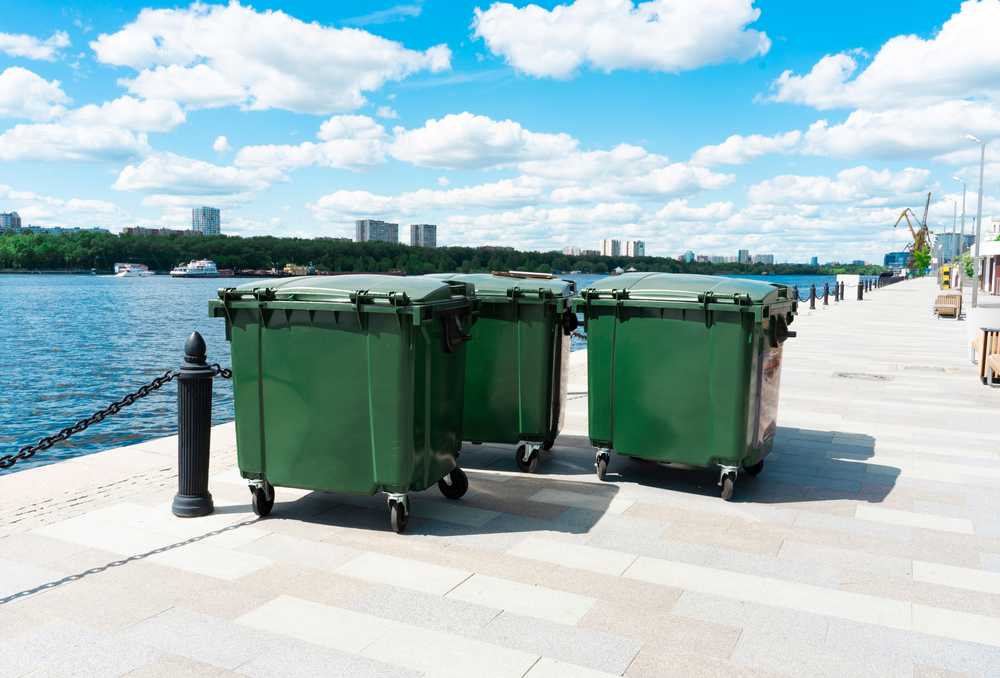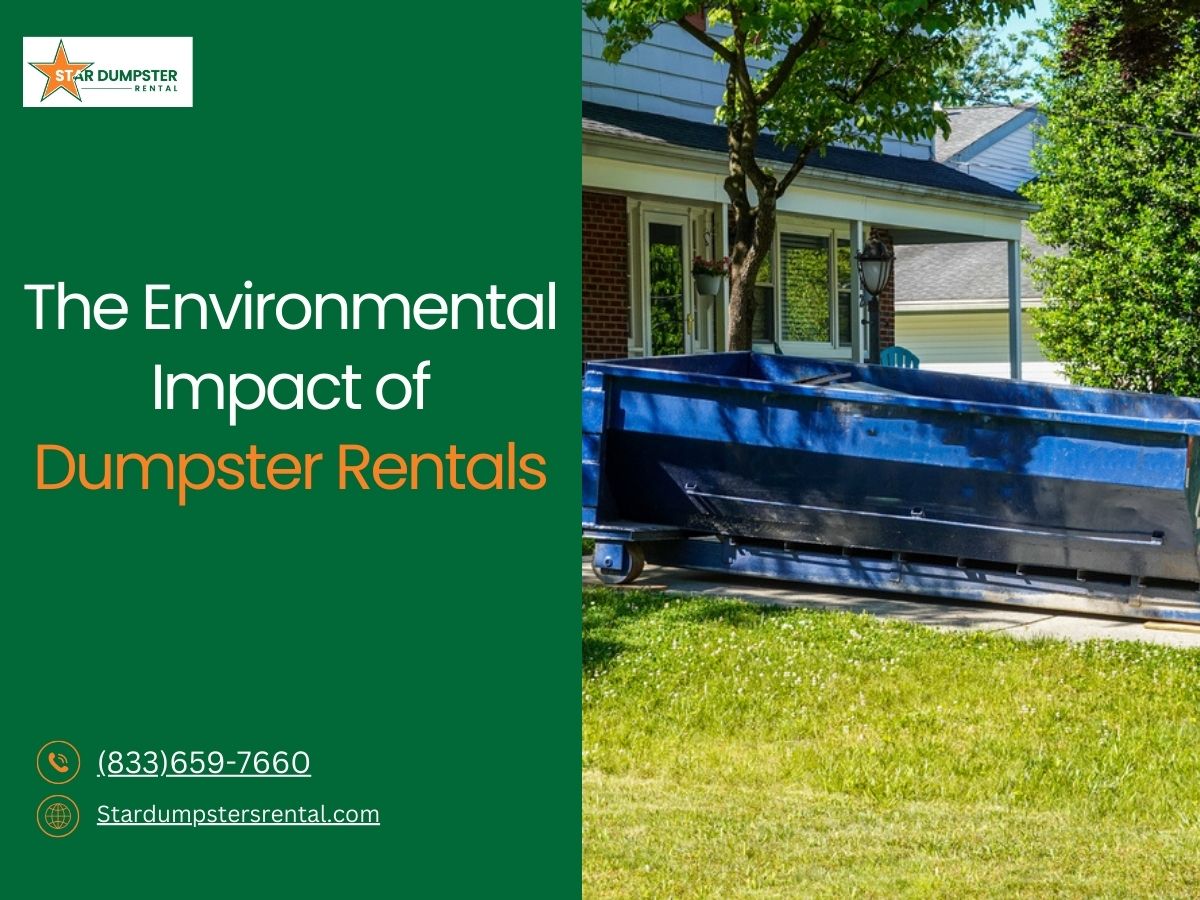Dumpster rentals play a pivotal role in waste management across residential, commercial, and construction settings, but they also come with environmental responsibilities. Understanding how dumpster usage impacts landfills, recycling processes, and overall ecological health is crucial for minimizing ecological footprints.
At Star Dumpster Rentals, we offer a comprehensive dumpster rental service tailored to meet the diverse needs of our clients. Whether you’re embarking on a home improvement project, handling construction projects, or managing roofing projects, our range of container sizes ensures the perfect fit for every job.
We provide everything from small dumpster sizes for unwanted junk removal to large commercial dumpsters ideal for light demolition. Our flexible rental periods make it easy to align with project schedules, ensuring efficiency and convenience. At Star Dumpster Rentals, transparent pricing means no surprises, just quality service tailored to your specific needs.
What type of waste dumpster handles in which size?
Dumpsters come in various sizes, each designed to handle different types and volumes of waste efficiently. Here’s a breakdown of common dumpster sizes and the types of waste they typically handle:
10-Yard Dumpster
- Ideal for: Small-scale renovation projects, garage cleanouts, and minor landscaping jobs.
- Typical waste: Household junk, small furniture items, and yard debris.
20-Yard Dumpster
- Ideal for: Medium-sized renovation and remodeling projects, including floor removals and roof replacements.
- Typical waste: Construction debris, larger household items, and roofing materials.
30-Yard Dumpster
- Ideal for: New home construction, major home additions, and large-scale cleanouts.
- Typical waste: Construction and demolition debris, large furniture, and significant amounts of yard waste.
40-Yard Dumpster
- Ideal for: Commercial construction projects, large residential renovations, and events where substantial waste is generated.
- Typical waste: Bulky materials, extensive demolition debris, and large volumes of general waste.
What are The Environmental Impacts of Dumpster Rentals?
- Landfill Overload: Using dumpsters ultimately results in large quantities of waste at the landfill. This then causes environmental degradation, such as leachate contamination of the soil and groundwater, plus methane emission – a significant greenhouse gas from the decomposition of waste.
- Resource Depletion: Much of the material that gets dumped in dumpsters—construction waste or old household items—contains resources that could be recycled or reused. Such materials, if not sorted for proper recycling, cause resources to be wasted since new ones would then have to be extracted in place of those that might have been recovered.
- Water and Air Pollution: Air is also polluted with carbon emissions during the transportation of dumpsters to and from waste disposal sites. Furthermore, landfill areas are likely to generate water pollution from both run-off and leaching of poorly managed waste, subsequently affecting local watercourses and ecosystems.
- Impact on Biodiversity: Landfills and improper waste disposal can negatively affect local flora and fauna. The destruction of habitats due to landfill expansion and the potential toxicity of waste materials can significantly reduce biodiversity in and around disposal sites.
- Energy Use: The process of manufacturing new dumpsters also involves high energy use and transportation of waste, not to mention the case when the materials are not recycled. This, therefore, sums up the total environmental effect, for example, the release of greenhouse gases and more carbon emissions.
Sustainable Practices in Dumpster Rentals
- Enhanced Recycling Programs: Implementing comprehensive recycling strategies to ensure waste materials are properly sorted and recycled, reducing landfill contributions and conserving resources.
- Proper Waste Segregation: Encouraging customers to segregate waste at the source, providing different containers for various types of waste (e.g., organics, recyclables, and general waste) to facilitate more effective recycling and disposal.
- Use of Eco-Friendly Materials: Utilizing dumpsters made from recycled or environmentally friendly materials to reduce the environmental impact associated with production.
- Energy-Efficient Transportation: Investing in fuel-efficient or electric vehicles for transporting dumpsters to and from sites to minimize carbon emissions and reduce overall energy consumption.
- Transparent Pricing Models: Offering clear and straightforward pricing that encourages customers to choose appropriate dumpster sizes and services that align with their actual needs, preventing waste overflow and reducing unnecessary pickups.

What are the advantages of Dumpster Rentals?
- Convenience: Dumpster rentals function as a conveniently effective waste removal tool, enabling one to put the entire content of trash or debris into the container and then pick up the loaded container at the disposal facility.
- Cost-Effectiveness: Renting a dumpster is more affordable but cheaper than other waste removal systems, especially in cases where a large amount of waste is produced. It thus eliminates the costs of loads between the different points of production and disposal and unifies them to a single service fee.
- Improved Safety: The use of bins allows construction and repair businesses to become safe. Dumpsters help keep sites safe from where the trash can be disposed of, minimizing the possibility of slip and fall hazards due to the scattered materials of waste.
- Versatility: These receptacles are all-around and can accommodate all types of waste, such as yard trimmings, construction debris, household junk, and roofing materials, hence their applicability to different undertakings.
- Environmental Responsibility: If adhering to the guidelines of proper waste management, dumpster rentals can be a positive aspect of environmental sustainability. These technologies improve the recycling and waste sorting processes, minimizing the footprint of a project and the pollutants it contributes to the environment.
- Regulatory Compliance: Dumpsite rental companies know the regional waste management regulations, increasing the chances that wishful garbage transport is the case. This aids in the evasion of legal penalties and environmental pollution.
Conclusion
In conclusion, the judicious application of roll-off dumpster rentals provides an efficient method for handling waste, especially in sectors across North America. These services not only streamline the process of removing and disposing of heavy materials and hazardous waste but also ensure safer environments in both commercial and residential settings.
By utilizing a dumpster company that offers diverse dumpster rental sizes and specializes in both commercial dumpster rental and residential dumpsters, clients can achieve significant operational efficiency. Moreover, with a dedicated pick-up service, these companies reinforce their commitment to sustainability and regulatory adherence, making dumpster rentals an indispensable part of modern waste management strategies.


